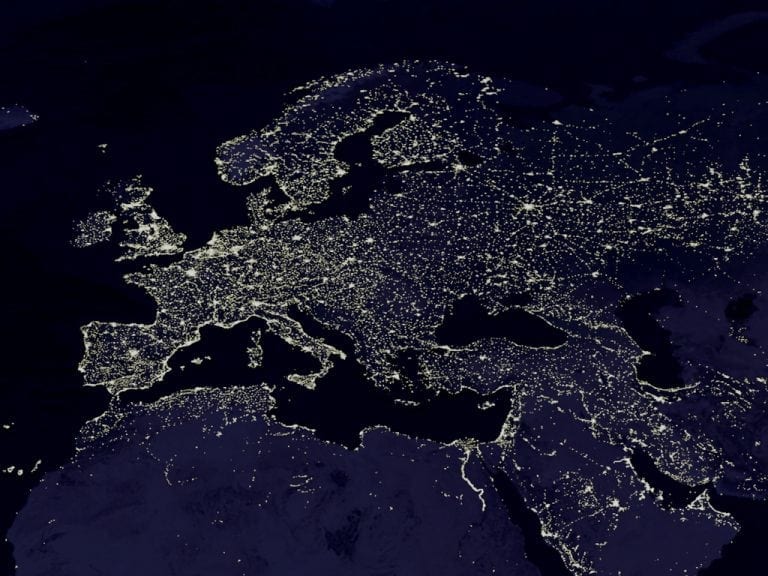WHAT IS EUROPE. CONTINENT OR PENINSULA?
![]()
//
Gaither Stewart
Rome— You drive around Europe these days practically non-stop border control free. The “Old Europe” of pre-European Union times—the quaint Europe of passport and visa checks, money-exchanges, different-country-different-language, the Europe of the many ethnicities and cultures and enmities—seems to be dead.
Certainly dead and gone in the minds of its unelected leaders in Brussels. Former optimists, who have finally become aware that EU-NATO Europe is not working for Europe’s own interests, hope that the “union’s” drowsy condition is merely deceptive. They might hope that Old Europe is in a capitalistic-neocolonialistic-induced deep sleep, a coma from which it however currently shows faint but here and there significant signs of arousal, a Europe unenthusiastic about ridiculous and downright criminal US policies in Syria, Ukraine and in general the Middle East.
Yet, realists know that that variegated Europe as such is not even a continent as commonly believed and has little clout in world affairs. Moreover, although the EU expands in size, it is shrinking in world influence. Geographically, what we call the continent of Europe is not a continent. It is simply a peninsula of Eurasia, as the world map shows clearly.
The putative continent of Europe once seemed limitless in its extensions over the plains to the East. But a closer look at a world map shows that “Europe” is a mere peninsula attached to the planetary heartland of Eurasia. It is a bunch of rich but old and divided countries. As such it lacks a decisive role in world affairs today. That reality is not digestible to Europe itself, accustomed to a leading role in the world..
Still, before the so-called “union” of Europe, non-European visitors were both bewildered and charmed by the conglomeration of states of different customs and speech, which in the eyes of visionary state leaders like Charles DeGaulle reached all the way to Russia’s Ural Mountains, out there in the mists of the eastern marches of the land mass of Eurasia. As such it nonetheless formed a “kind of continent” and had a voice in world affairs
In reality, the Europe that Westerners—non-Europeans and Europeans alike—knew and loved is that peninsula, the tail end, pointing instead westwards today, toward the Americas. The countless border controls and currency exchanges were oh so romantic, though confusing and annoying. Suspicious French exit controls and tout de suite après, the lackadaisical but slow and showy Italian entry check points. The usual lines on one side of the border or the other at the money changers. The old disputed border zones with their mishmash of languages and peoples who only thought they knew who they were.
Today, Europe, still loved by many, detested by many others, has lost its superficial attractiveness. Why, one wonders, has it lost its sheen? What happened? In my opinion, imitation of America is part of the answer. Europe’s own savage capitalism and its imitation of the life style in victorious America, combined with the Disneyland reproduction of its own quaintness for the benefit of foreign visitors perpetuated a great misunderstanding. Anyone who has traveled to the cinematic towns along Germany’s Romantische Strasse or seen Prague after its whitewash following the fall of Czech Communism will know what I mean.
EU Europe is not the Europe of the peoples that some of its founders intended. If it now hesitates in its support of the USA (not much, just a bit for its own ego) EU Europe is no less capitalist and imperialist than its [upstart] masters, the USA. It is a reflection of the USA in a minor key.
In reality, a more authentic European life style is engaged in a battle for survival. A few bedraggled left forces here and there in France and Italy, for example, raise weak pleas for a Europe based on social justice, without however recognition of the real problem: capitalism and its imperialistic urge. While capitalism gnaws away at the social state from within and without, mild symptoms of renewal are signaled by the emergence of Syriza in Greece, Die Linke in Germany, Podemos in Spain, Corbyn’s design of a new Labour Party in the UK, le Front de Gauche in France, offering alternatives such as “civil Socialism” exalting human rights and social solidarity (the modern social state is an achievement of European Socialism) and rejecting the hypocrisy of expressions such as the non-existent “international community”, in favor of a “new global internationalism” of the world proletariat. The latter has never been more potentially powerful than today: it has all the numbers. It has a huge planetary majority albeit never as suppressed as today in the claws of capitalist-imperialist globalization.
Though still a mix of nations, languages and borders, and an even greater mixture of nationalities, this ethnically divided European peninsula prefers the present loose confederation, which for most member states already has too much power to control and audit and limit French or German, Italian or Spanish national interests.
Europeans want their cake … and to eat it too, They want some sort of union without surrendering basic national interests. A single currency, the Euro, is convenient, but in every country movements and some political parties—roughly one-third of electorates—propose a return to their own traditional national currencies Disunity reigns even in the isolated atmosphere of EU bureaucrats nestled in their sinecures in their putative capital of Brussels.
In light of the above it is a geopolitical error of the USA to imagine the European Union as the real Europe or as a genuine international partner. Vassal, yes, trustworthy ally, no.
The 450 million Europeans do not want to form a nation. They are still French or Italian or Austrian or Hungarian or Pole or British (in reality not even British, but English and Scots and Irish and Welsh), all dominated by 90 million Germans striving for hegemony not only in the EU but in all of Europe.
As Eric Zuesse explained in his recent Greanville Post article, “The Western Alliance Is Crumbling”, a great conflict within the shaky Anglo-European alliance concerns Obama’s proposed treaty with European states, the Transatlantic Trade and Investment Partnership (TTIP), which would give international corporations rights to sue national governments in non-appealable global private arbitration panels, the dictates of which would stand above any member-nation’s laws, therefore unlikely to ever pass. Elected government officials would have no control over policies aimed at isolation from international trade with Russia and China. It would leave America’s international corporations controlling virtually the entire world.
It is doubtful that the European Commission can muster enough support for Obama’s proposed TTIP, actually concerning “more than just trade and economics.” In any case the proposed deal with Europe can be considered dead. According to Zuesse, France is considering termination of negotiations on the TTIP chiefly because of a lack of transparency on the part of America.
In the meantime that continental desire of Europe to be a world power has not died. Realization of that aspiration, Europe is again beginning to understand, is impossible without Russia, while the USA has become an albatross tight around Europe’s neck.
The Fifth Sun (Punto Press). He’s also the author of several other books, including the Europe Trilogy, of which the first two volumes (The Trojan Spy, Lily Pad Roll) have been published by Punto Press. These are thrillers that have been compared to the best of John le Carré, focusing on the work of Western intelligence services, the stealthy strategy of tension, and the gradual encirclement of Russia, a topic of compelling relevance in our time. He makes his home in Rome, with wife Milena. Gaither can be contacted at gaithers@greanvillepost.com. His latest assignment is as Managing Editor with the Russia Desk.
Note to Commenters
Due to severe hacking attacks in the recent past that brought our site down for up to 11 days with considerable loss of circulation, we exercise extreme caution in the comments we publish, as the comment box has been one of the main arteries to inject malicious code. Because of that comments may not appear immediately, but rest assured that if you are a legitimate commenter your opinion will be published within 24 hours. If your comment fails to appear, and you wish to reach us directly, send us a mail at: editor@greanvillepost.com
We apologize for this inconvenience.
![]() Nauseated by the
Nauseated by the
vile corporate media?
Had enough of their lies, escapism,
omissions and relentless manipulation?
Send a donation to
The Greanville Post–or
But be sure to support YOUR media.
If you don’t, who will?


